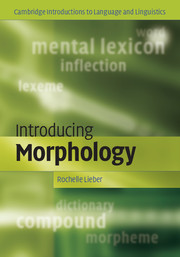Book contents
- Frontmatter
- Contents
- Preface
- The International Phonetic Alphabet
- Point and manner of articulation of English consonants and vowels
- 1 What is morphology?
- 2 Words, dictionaries, and the mental lexicon
- 3 Lexeme formation: the familiar
- 4 Productivity and creativity
- 5 Lexeme formation: further afield
- 6 Inflection
- 7 Typology
- 8 Words and sentences: the interface between morphology and syntax
- 9 Sounds and shapes: the interface between morphology and phonology
- 10 Theoretical challenges
- Glossary
- References
- Index
2 - Words, dictionaries, and the mental lexicon
- Frontmatter
- Contents
- Preface
- The International Phonetic Alphabet
- Point and manner of articulation of English consonants and vowels
- 1 What is morphology?
- 2 Words, dictionaries, and the mental lexicon
- 3 Lexeme formation: the familiar
- 4 Productivity and creativity
- 5 Lexeme formation: further afield
- 6 Inflection
- 7 Typology
- 8 Words and sentences: the interface between morphology and syntax
- 9 Sounds and shapes: the interface between morphology and phonology
- 10 Theoretical challenges
- Glossary
- References
- Index
Summary
CHAPTER OUTLINE
In this chapter you will learn why we make a basic distinction between the dictionary and the mental lexicon.
We will look at how linguists study the mental lexicon and how children acquire words.
We will consider whether complex words are stored in the mental lexicon, or derived by rules, or both.
And we will look further at how dictionaries have evolved and how they differ from one another and from the mental lexicon.
KEY TERMS
word, mental, lexicon, lexicography, the Gavagai problem, fast mapping, aphasia
Introduction
In the last chapter, we raised the question “what's a word?” And we saw in section 1.2 that this question actually subsumes two more specific questions. In this chapter we will look more closely at those questions.
On the one hand, when we ask “what's a word?,” we may be asking about the fundamental nature of wordhood – as we saw, a far thornier philosophical question than it would seem at first blush. Native speakers of a language seem to know intuitively what a ‘word’ is in their language, even if they have trouble coming up with a definition of ‘word’. Interestingly, the Oxford American Dictionary seems to bank on this intuitive knowledge when it defines a word as “a single distinct meaningful element of speech or writing, used with others (or sometimes alone) to form a sentence and typically shown with a space on either side when written or printed.”
- Type
- Chapter
- Information
- Introducing Morphology , pp. 11 - 30Publisher: Cambridge University PressPrint publication year: 2009
- 1
- Cited by



